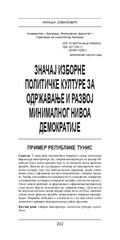Приказ основних података о документу
Značaj izborne političke kulture za održavanje i razvoj minimalnog nivoa demokratije - primer Republike Tunis
The importance of electoral political culture of developing and maintaining a minimum level of democracy: A case study of the Republic of Tunisia
| dc.creator | Jovanović, Nataša | |
| dc.date.accessioned | 2021-10-12T12:14:56Z | |
| dc.date.available | 2021-10-12T12:14:56Z | |
| dc.date.issued | 2015 | |
| dc.identifier.issn | 0023-5164 | |
| dc.identifier.uri | http://reff.f.bg.ac.rs/handle/123456789/2090 | |
| dc.description.abstract | U ovom radu primenićemo teorijski okvir minimalne definicije demokratije (tj. izborne demokratije) na primer Republike Tunis nakon promena koje su se dogodile posle Arapskog proleća. Želimo da ilustrujemo hipotezu da demokratska politička kultura, koja ima kontinualan karakter, može imati važnu ulogu u održavanju nukleusa demokratije - izbornog procesa. Takođe, pokušaćemo da pokažemo da su specifično (liberalno i tolerantno) kulturno- istorijsko nasleđe i politička praksa u Tunisu važni faktori za formiranje i održavanje demokratije u toj zemlji (bar na minimalnom tj. izbornom nivou). Cilj nam je da pokušamo da damo makar okvirnu ocenu da li se Tunis, nekoliko godina nakon Arapskog proleća, može nazvati izbornom demokratijom. Posredno, biće reči i o tome da li i na koji način islam može biti prepreka demokratizaciji jednog društva. | sr |
| dc.description.abstract | In this paper, we will apply the theoretical framework of the minimal definition of democracy (electoral democracy) to the example of the Republic of Tunisia after the changes that have occurred after The Arab Spring. We wish to illustrate the hypothesis that democratic political culture, which has a permanent character, can play an important role in maintaining the nucleus of democracy - the electoral process. Also, we will try to show that specific (liberal and tolerant) cultural - historical heritage and political practice in Tunisia are important factors for the formation and maintenance of democracy in that country (at the minimum level). Our goal is to try to give a general evaluation of whether Tunisia, a few years after The Arab Spring, can rate as electoral democracy. Indirectly, we will discuss how Islam can be barrier to the democratization of society. | en |
| dc.publisher | Zavod za proučavanje kulturnog razvitka, Beograd | |
| dc.rights | openAccess | |
| dc.source | Kultura | |
| dc.subject | Tunis | sr |
| dc.subject | politička kultura | sr |
| dc.subject | izborna demokratija | sr |
| dc.subject | islam | sr |
| dc.subject | Tunisia | en |
| dc.subject | political culture | en |
| dc.subject | Islam | en |
| dc.subject | electoral democracy | en |
| dc.title | Značaj izborne političke kulture za održavanje i razvoj minimalnog nivoa demokratije - primer Republike Tunis | sr |
| dc.title | The importance of electoral political culture of developing and maintaining a minimum level of democracy: A case study of the Republic of Tunisia | en |
| dc.type | article | |
| dc.rights.license | ARR | |
| dc.citation.epage | 223 | |
| dc.citation.issue | 148 | |
| dc.citation.other | (148): 202-223 | |
| dc.citation.rank | M51 | |
| dc.citation.spage | 202 | |
| dc.identifier.doi | 10.5937/kultura1548202J | |
| dc.identifier.fulltext | http://reff.f.bg.ac.rs/bitstream/id/883/2087.pdf | |
| dc.type.version | publishedVersion |

